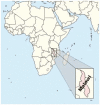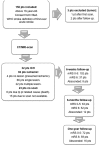Stroke outcomes in Malawi, a country with high prevalence of HIV: a prospective follow-up study
- PMID: 22479439
- PMCID: PMC3315584
- DOI: 10.1371/journal.pone.0033765
Stroke outcomes in Malawi, a country with high prevalence of HIV: a prospective follow-up study
Abstract
Background: Stroke contributes significantly to disability and mortality in developing countries yet little is known about the determinants of stroke outcomes in such countries. 12% of Malawian adults have HIV/AIDS. It is not known whether having HIV-infection alters the outcome of stroke. The aim of this study was to document the functional outcome and mortality at 1 year of first-ever acute stroke in Malawi. Also to find out if the baseline variables, including HIV-infection, affect the outcome of stroke.
Methods and findings: 147 adult patients with first-ever acute stroke were prospectively followed up for 12 months. Conventional risk factors and HIV-infection were assessed at baseline. Stroke severity was evaluated with modified National Institute of Health Stroke Scale (mNIHSS) and functional outcome with modified Rankin scale (mRS). Fifty (34%) of patients were HIV-seropositive. 53.4% of patients had a poor outcome (severe disability or death, mRS 4-6) at 1 year. Poor outcome was related to stroke severity and female gender but not to presence of HIV-infection. HIV-seropositive patients were younger and had less often common risk factors for stroke. They suffer more often ischemic stroke than HIV-seronegative patients.
Conclusions: Mild stroke and male gender were associated with favourable outcome. HIV-infection is common in stroke patients in Malawi but does not worsen the outcome of stroke. However, it may be a risk factor for ischemic stroke for young people, who do not have the common stroke risk factors. Our results are significant, because stroke outcome in HIV-seropositive patients has not been studied before in a setting such as ours, with very limited resources and a high prevalence of HIV.
Conflict of interest statement
Figures


References
-
- Lopez A, Mathers C, Ezzati M, Jamison D, Murray C. Global burden of disease and risk factors. 2006. pp. 1–13. World Bank, Washington (DC) - PubMed
-
- Garbusinski J, van der Sande M, Bartholome E, Dramaix M, Gaye A, et al. Stroke presentation and outcome in developing countries. Stroke. 2005;36:1388–1393. - PubMed
-
- Sene Diouf F, Basse AM, Ndao AK. Functional prognosis of stroke in countries in the process of development: Senegal (in French). Ann Readapt Med Phys. 2006;49:100–104. - PubMed
-
- Kumwenda JJ, Mateyu G, Kampondeni S, van Dam AP, van Lieshout L, et al. Differential diagnosis of stroke in a setting of high HIV prevalence in Blantyre, Malawi. Stroke. 2005;36:960–964. - PubMed
-
- Hoffmann M, Berger JR, Nath A, Rayens M. Cerebrovascular disease in young, HIV-infected, black Africans in the KwaZulu Natal province of South Africa. J Neurovirol. 2000;6:229–236. - PubMed
Publication types
MeSH terms
LinkOut - more resources
Full Text Sources
Medical

